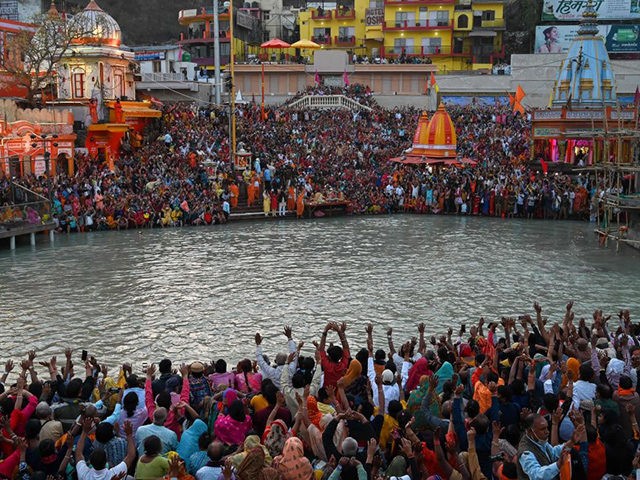Hundred of thousands of Hindu pilgrims packed the banks of the Ganges River in northern India on Thursday for a chance to bathe in the sacred waterway as part of the major Kumbh Mela Hindu festival.
The city of Haridwar in Uttarakhand state was chosen to host the seven-week long Kumbh Mela festival this year. Haridwar hosted up to one million Hindu pilgrims on the first day of Kumbh Mela, January 14. Authorities in the city expect “several million” people to visit the Ganges’ banks in Haridwar by the end of the festival on April 27.
Hundreds of thousands take holy dip in India #AFP https://t.co/rI86iec2Ao
📸 @PrakashAFPLive pic.twitter.com/oqKPQLogc7— AFP Photo (@AFPphoto) March 12, 2021
“Before dawn men, women, and children jostled for space along the several miles of riverbank before a brief plunge in the fast-flowing water, singing hymns and showering flowers into the Ganges,” Agence France Press (AFP) reported of the celebration in Haridwar on March 11.
“The highlight later was set to be a jubilant procession by groups of hundreds of Naga Sadhus — naked holy men with long dreadlocks, their bodies smeared in ash — before their dip in the holy town in the Himalayan foothills,” AFP added.
Chief Minister of Uttarakhand Tirath Singh Rawat ordered a helicopter to fly over Haridwar on March 10 “to shower Kumbh Mela pilgrims with flowers … on the occasion of Mahashivratri,” according to the Economic Times of India. Maha Shivratri is one of three auspicious bathing days during the weeks-long Kumbh Mela festival.
“The visitors should be able to take a holy dip in the Ganga [Ganges] conveniently. The honor of seers is paramount. A grand and divine Kumbh should be ensured,” Rawat said.
While Uttarakhand state authorities officially ordered that pilgrims in Haridwar observe certain anti-coronavirus measures during the festival, such as social distancing and mask-wearing, most participants have openly flouted the measures and worshipped without restriction.
“There is no fear of the pandemic and people are moving freely. India has already defeated the disease and there’s nothing to worry about,” pilgrim Nitesh Kumar, 31, told AFP on Thursday, referring to the recent drop in active coronavirus cases throughout much of India, home to 1.4 billion people.
“I have been waiting for this day for years but because of the pandemic I thought it will be cancelled. But our belief is stronger than the pandemic,” another pilgrim named Rishab told the news agency.
Kumbh Mela loosely translates to “festival of the sacred pitcher” and is known as the “world’s largest human gathering.”
“According to Hindu mythology, gods and demons fought a war over a sacred pitcher containing the nectar of immortality. Drops fell at four different locations, which now alternate as hosts for the immense gatherings,” AFP noted Thursday.
UNESCO designated the Kumbh Mela an “intangible cultural heritage of humanity” in 2017. The last Kumbh Mela took place in the Uttar Pradesh city of Allahabad in 2019 and attracted roughly 120 million Hindu pilgrims to the Ganges’ banks.

COMMENTS
Please let us know if you're having issues with commenting.